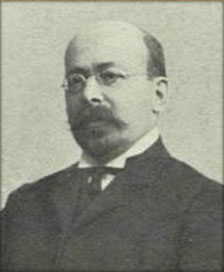Sergei Iosifovich Hessen (Polish: Sergius Hessen) Born August 16 [28], 1887, Ust-Sysolsk. Date of death: June 2, 1950, Lodz. Russian neo-Kantian philosopher, teacher, jurist, publicist, co-editor of the Logos magazine
Biography
Born into the family of exiled lawyer Joseph Saulovich (later Vladimirovich) Gessen, who was able to adopt a child only in 1894 after converting to Orthodoxy. He was raised by his father and adoptive mother Anna Isaakovna Blumenfeld.
From 1917 to 1921 he headed the department of pedagogy at the Faculty of History and Philology of Tomsk State University; in 1921 he returned to Petrograd.
In 1922 he emigrated to Prague. From 1935 he taught in Warsaw, and after the war in Lodz, where he was professor of the history of pedagogy at the University of Lodz.
Philosophy
Hessen combines the principles of transcendentalism with the dialectical method, which makes it possible to connect independent groups of concepts. Allowing pluralism in the taxonomy of concepts, Hessen argues that the true hierarchy of concepts must necessarily be a synthesis of monism and pluralism on the basis of the dialectical “method of completeness” he proposed, according to which the synthesis of the particular and the general is the concreteness of concepts, and their mutual disunity is abstractness. The method of completeness allows us to overcome the derogation of concreteness and dialectically expand monism into pluralism.
The empirical subject is only a possibility of personality; personality itself is created only through work on super-personal tasks and through the introduction of “supra-personal” transcendental values to the world. Freedom is assumed due to the independence of the spiritual basis of personality from the empirical sphere, therefore the beginning of freedom in a person is transcendental. Freedom is revealed not as an empirical fact, but as a goal, a volitional intention. In accordance with this, it is possible to identify values that embody goals or objectives. They act as cultural values, expressed in practically realizable values of human life. Free actions are unconditionally new and cannot be calculated empirically. Ethics and law provide mechanisms for the realization of freedom that embody the practical intuition of the will—volition.
Based on this understanding of personality, Hessen creates his own philosophy of education. Freedom is the basis of the relationship between teacher and student and does not imply a choice between existing paths, but the creation of a new path that did not previously exist even as a possible exit. Therefore, in education, discipline is realized through freedom, and freedom through the law of duty. The task of training is to master the method in such a way that opens up the possibility of its independent application. Teaching should not be reduced to the transmission of factual knowledge; what is said should always point to something more, to another knowledge that has not yet been expressed. The purpose of education is to familiarize the individual with cultural values that open up new opportunities for self-realization. In a number of works, Gessen also considered problems of moral philosophy, legal theory, and patterns of social development.
Family
Wife (until 1936) – Nina Lazarevna Minor, daughter of neuropathologist Lazar Solomonovich Minor, granddaughter of the state rabbi of Moscow Zelik (Solomon Alekseevich) Minor, niece of lawyer and political figure Osip Solomonovich Minor. Deported to the Terezin concentration camp in 1942, she died in the Maly Trostinets concentration camp.
Son – Evgeny Sergeevich Gessen (1910-1945) – Russian poet, member of the community of young poets “Skeet”; died in Auschwitz. Another son – Polish Slavist Dmitry Sergeevich Gessen (1916-2001) – participant in World War II, compiler of the “Big Polish-Russian Dictionary” (M.: Russian Language, 1979) and the posthumous collection of the literary heritage of Solomon Barth (together with Lazar Fleishman, M. .: Aquarius, 2008).
Half-brothers (on the father’s side): journalist and publicist Vladimir Iosifovich (Osipovich) Gessen (1901-1982), employee of the editorial office of the newspaper “New Russian Word”; translator Georgy Iosifovich (Osipovich) Gessen (1902-1971).
